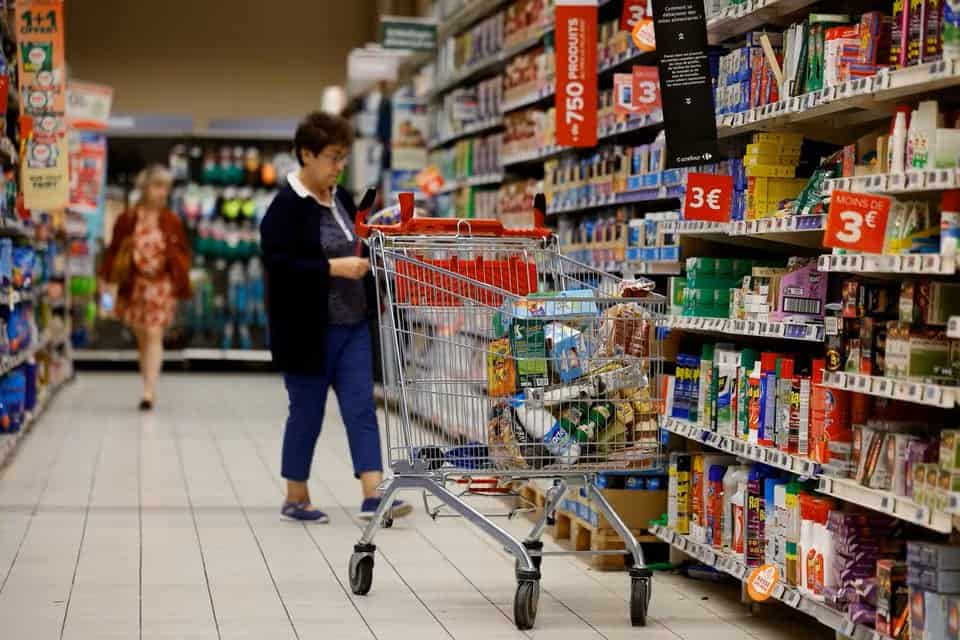Reporting by Richa Naidu; Editing by Kirsten Donovan


France has long outstripped Germany, Italy, Spain and others as the European Union’s biggest market for groceries by supermarket revenue, according to research firm IBISWorld.
But with a view to securing price cuts by mid-January, the French government is bringing forward annual price negotiations between retailers and their suppliers to start by mid-October.
Retailers like Carrefour (CARR.PA) have accused global consumer goods makers including Nestle, Unilever (ULVR.L) and Pepsico (PEP.O) of not “co-operating”.
Speaking on Sunday night, French President Emmanuel Macron also criticised the companies for maintaining high prices despite a decline in inflation.
“Price freezing doesn’t work,” he said. We must “put everyone around the table, and find an agreement on margins”.
Carrefour, which has pricing power as France’s No.2 supermarket operator, last week slapped “shrinkflation” labels on products that are getting smaller with no reduction in price.
Data compiled for Reuters by Bernstein shows France accounted for an estimated 8% of Activia yogurt-maker Danone’s total reported sales in 2022, and nearly 4% of Nestle’s annual sales. In both cases, the United Kingdom came second.
Unilever, with more than 400 brands including Dove soap and Knorr stock cubes, counts France its third biggest Western European market at 2.2% of annual sales, after the UK and Germany.

Danone will be feeling some of the greatest pressure to lower prices, said Bernstein analyst Bruno Monteyne.
“Its products are a lot more commoditised – yogurt is yogurt and there are private label alternatives,” he said. “(Nestle’s) Nespresso is not as easy to switch.”
Retailers will say to those in a weaker position, “you need me more than I need you”, he added.
Nestle and Unilever declined to comment and Danone did not respond to a request for comment.
Laurent Cenatiempo, Competition and Legal Affairs Manager at European Brands Association AIM, said consumer goods groups would fear retailer retaliation.
“What matters is bargaining power and the fact that big brands need to be on major retailers’ shelves…Unilever, Coca-Cola, all of them have their hands tied because the retailers’ market shares are indispensable.”
Representatives of the food industry, speaking to French lawmakers on Wednesday, argued that production costs remain high after two years of sky-rocketing input, supply chain and labour costs, with manufacturers absorbing a significant part of the inflationary shock themselves.
But retailers say cost pressures are easing now while investors have voiced concerns that rising prices will alienate shoppers and hit sales volumes.
Supermarket groups in France could demand price cuts of 2%-5% from food manufacturers in the negotiations, the head of retailer Les Mousquetaires Thierry Cotillard said on Wednesday.
There could also be ramifications elsewhere in Europe because grocers are part of buying alliances, industry experts told Reuters last week.
“Carrefour is negotiating on an international basis,” Laurent Thoumine, Europe lead for consultancy Accenture’s retail industry practice, said.
“Consumer goods companies that are not collaborating the right way to optimise price are going to face some difficulties.”
Reporting by Richa Naidu; Editing by Kirsten Donovan
Legal notice about Intellectual Property in digital contents. All information contained in these pages that is NOT owned by eDairy News and is NOT considered “public domain” by legal regulations, are registered trademarks of their respective owners and recognized by our company as such. The publication on the eDairy News website is made for the purpose of gathering information, respecting the rules contained in the Berne Convention for the Protection of Literary and Artistic Works; in Law 11.723 and other applicable rules. Any claim arising from the information contained in the eDairy News website shall be subject to the jurisdiction of the Ordinary Courts of the First Judicial District of the Province of Córdoba, Argentina, with seat in the City of Córdoba, excluding any other jurisdiction, including the Federal.
1.
2.
3.
4.
5.
eDairy News Spanish
eDairy News PORTUGUESE
